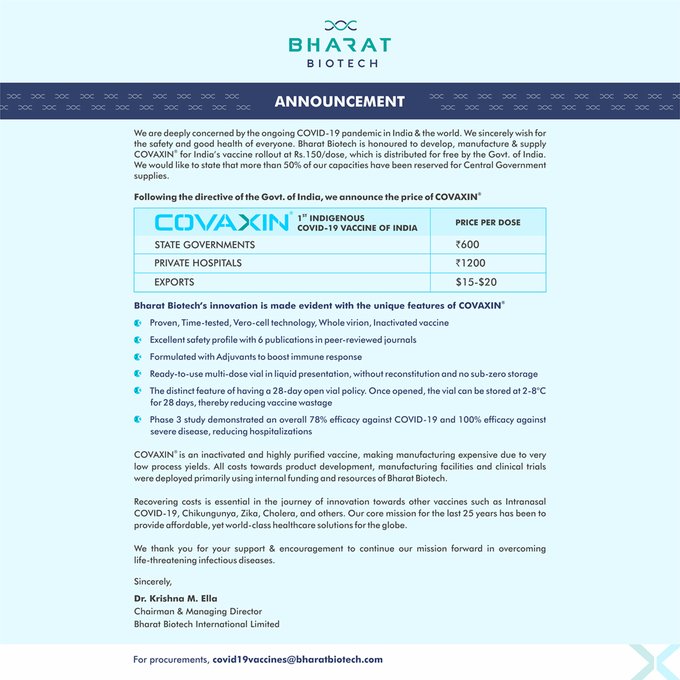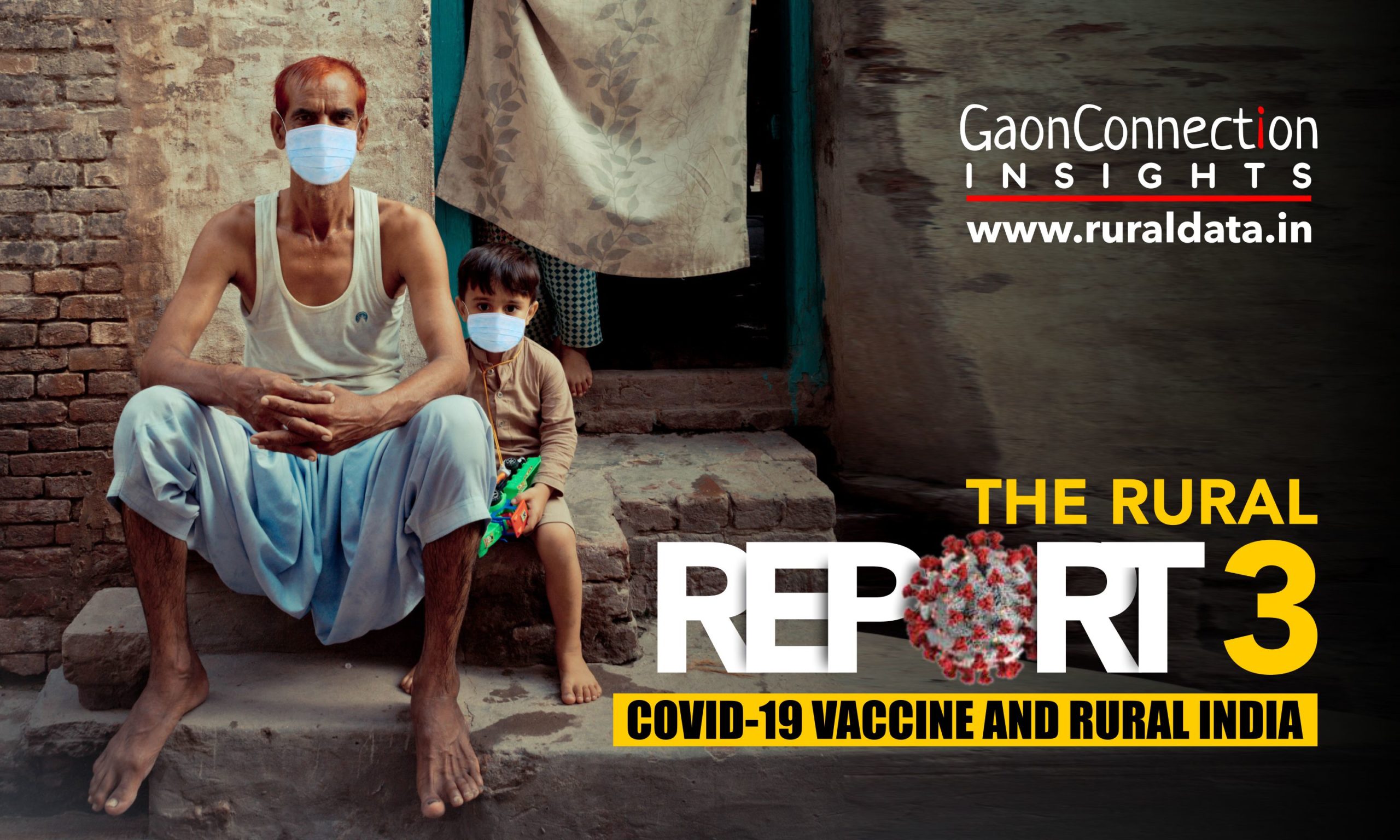Two vaccine manufacturers, Bharat Biotech and Serum Institute of India, whose Covishield and Covaxin vaccines respectively are being administered to citizens across India as part of the COVID19 vaccination drive have recently announced prices of their vaccines.
Yesterday, April 24, Bharat Biotech International Ltd announced that “following the directives of the Government of India”, the price of Covaxin, India’s first indigenous COVID-19 vaccine, will be Rs 600 per dose for state governments and Rs 1,200 per dose for private hospitals. The same would be exported at $15-$20 per dose.
Meanwhile the same vaccine is being supplied to the central government at Rs 150 per dose, which the Indian government is distributing free of cost. The company informed that 50 per cent of its capacities “have been reserved for Central Government supplies”.

Justifying the pricing of its vaccine, Bharat Biotech’s managing director Krishna M Ella said in the company’s statement: “COVAXIN is an inactivated and highly purified vaccine, making manufacturing expensive due to very low process yield. All costs towards product development, manufacturing facilities and clinical trials were deployed primarily using international funding and resources of Bharat Biotech. Recovering costs is essential in the journey of innovation…”
Serum’s Covishield
Three days before that, on April 21, Serum Institute of India Pvt Ltd also announced price of its Covishield vaccine. Covishield would be sold to the state governments for Rs 400 per dose and to the private hospitals for Rs 600 per dose. The company claimed that as compared to the other international COVID-19 vaccines, Covishield was ‘affordable’.
Serum Institute went on to inform that the company was scaling up the vaccine production, and is reserving 50 per cent of its capacities for the Indian government’s vaccination programme and the remaining for the state governments and the private hospitals.

These vaccine price announcements have faced stiff criticism and opposition from several public health experts and even state government representatives who have questioned differential pricing of the same vaccine to the central government, the state governments and private hospitals.
Yesterday, Serum Institute issued a media statement clarifying that “the price of the vaccine is still lower than a lot of other medical treatment and essentials required to treat COVID-19 and other life-threatening diseases”. It went on to say that “COVISHIELD is the most affordable COVID-19 vaccine available in the market today”.

Meanwhile, demands are being raised for the central government to invoke compulsory licensing and invite price bids from other pharmaceutical manufacturers that will include royalty payable to Serum Institute and Bharat Biotech.
From May 1, COVID-19 vaccination will be open to all above the age of 18 years. This means the demand for vaccine doses is expected to skyrocket. In the last few weeks, a number of state governments have already been pointing out shortage of vaccines. About 17 state governments, such as Maharashtra, Madhya Pradesh, Chhattisgarh, Kerala, etc, have recently announced free vaccination for its population.
Also Read: COVID19: Which states in India are reporting ‘vaccine shortage’? Details here
How many rural Indians can pay for the vaccine?
Four months back, in December 2020, Gaon Connection Insights, the data and insights arm of India’s biggest rural media platform Gaon Connection, released a one-of-its-kind rural survey on the perceptions of rural Indians around the coronavirus vaccine. Conducted across 16 states and one union territory, the survey findings were released as ‘The Rural Report 3: COVID-19 Vaccine and Rural India’, which is available in full for a free download on www.ruraldata.in.
Among several other things, the survey asked the rural respondents their willingness to pay for the COVID-19 vaccine. Thirty six per cent respondents said they would not pay for the vaccine. Meanwhile, slightly less than half (44 per cent) of the respondent households expressed that they would like to pay and get the coronavirus vaccine.

In the north zone, the highest percentage of households (51 per cent) expressed their willingness to pay for the corona vaccine followed by east-northeast (47 per cent), west zone (37 per cent) and south zone (33 per cent).
Of those who were willing to pay for the vaccine, around two-third such respondents said that they would like to pay less than Rs 500 for two doses of COVID vaccine. This means less than Rs 250 per dose of the vaccine.

However, Covishield is priced at Rs 400 per dose to the state governments and Rs 600 per dose to private hospitals. And Covaxin is priced Rs 600 per dose to the state governments and Rs 1,200 to private hospitals.
Gaon Connection Survey found that one-fourth respondents said they would like to pay between Rs 500 and Rs 1,000 for two doses of COVID vaccine. Meanwhile, around eight per cent were willing to pay between Rs 1,000 and Rs 2,000 for two doses of the vaccine.
Analysis by ration card status of the respondent households reflects 53 per cent of APL (above poverty line), 37 per cent of BPL (below poverty line) and 33 per cent of AAY (Antyodaya Anna Yojana) households said they would like to pay and get the COVID-19 vaccine.

Gaon Connection Survey also found that half the respondents (50.5 per cent) said they trusted Indian company vaccine whereas over 29 per cent said they trusted any vaccine recommended by the Indian government. Only 16 per cent trusted the vaccine by an international company.
This face-to-face survey, conducted between December 1 and December 10 last year, was carried out by Gaon Connection surveyors among 6,040 rural respondents across 60 districts in 16 states and one union territory. The selection of states, covering all regions of the country, was based on the prevalence of COVID-19 as per the COVID data of the Union ministry of health and family welfare, Government of India.
Read the survey ‘The Rural Report 3: COVID-19 Vaccine and Rural India’, report here.


















